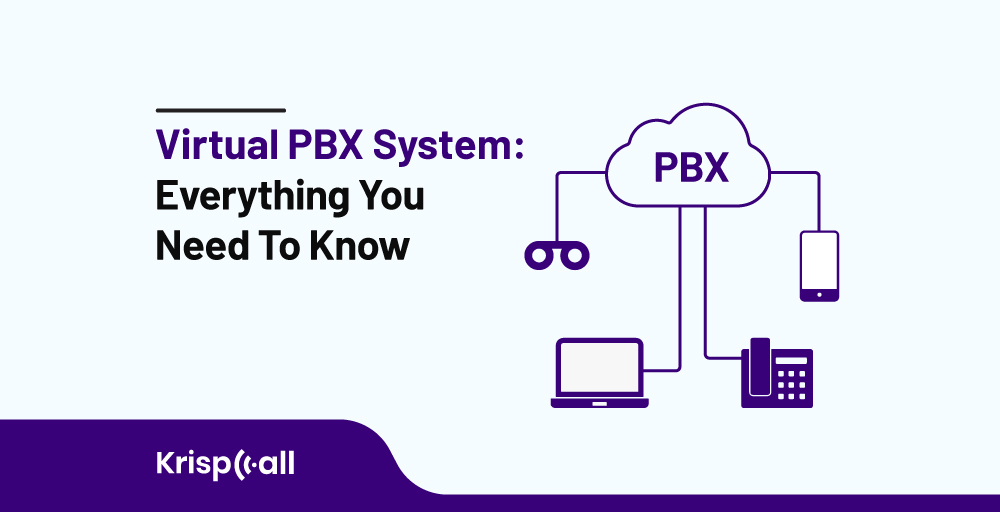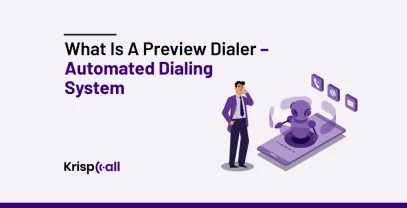Have the business calls got you tangled in wires and you are left frustrated? 😕
Worry no more as we bring you the solution: the Virtual PBX, your communication solution to all those phone problems! 😄 This cloud-powered system ditches messy wires and confusing tech, letting you make and receive calls with ease.
With this phone system, dropped calls and other communication issues will be a thing of the past, and you will be able to enjoy some of the best and crystal-clear phone calls.
So, whether you are a business owner looking for a new phone system or a managing director of a call center who wants a better change in the center, the Virtual PBX system is for you!
Without further ado, let’s dive deep into everything you need to know about Virtual PBX Systems.
Key Highlights
- A virtual PBX is a cloud-based phone system that improves business communication.
- A Virtual PBX system must-have features like Voicemail and Call Transcription, Mobile and Desktop Apps, Auto Attendant (IVR), Call Monitoring, and Integration.
- KrispCall is the best Virtual PBX service provider, followed by Grasshopper, DailerHQ, Exotel, and Dialpad.
- A virtual PBX system is important and can benefit businesses of all types and sizes.
Let’s start 🚀
What is a Virtual PBX System?
A virtual private branch exchange or simply virtual PBX is a VoIP phone system that connects two or more people via an internet connection rather than a physical wiring connection. Virtual PBX is also known as Cloud PBX, IP PBX, or hosted PBX services.
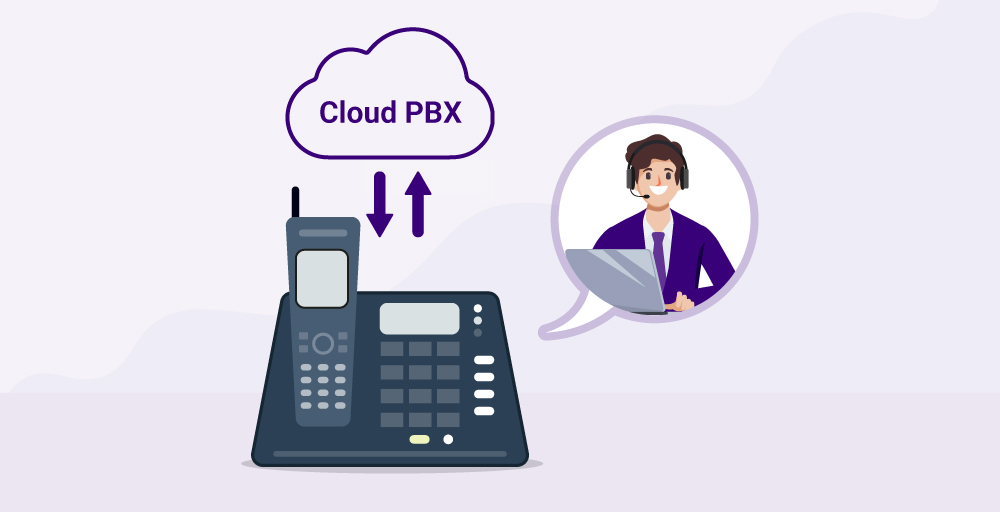
Virtual PBX system integrates all the features available in the traditional phone system, along with modern call management features.
Here are some of the best features offered in virtual PBX plans:
- Establish Local Presence: When using a virtual PBX, businesses have the option to select phone numbers that come with area codes, which can be more relatable to their target markets. They can even choose numbers for each of their locations. In addition, toll-free numbers can create a sense of trust and credibility in the location of operations.
- Cost Saving: Virtual or cloud-based PBX systems are hosted remotely by VoIP service providers, relieving companies utilizing PBX of the responsibility of system maintenance. Virtual PBX VoIP providers take care of all the software and hardware updates, addressing any problems that may arise and saving businesses from incurring IT staffing expenses.
- Advanced Features: Virtual PBX providers incorporate a range of VoIP features into their phone plans, surpassing the idea of just making calls. In addition, PBX users benefit from a host of business communication tools. These include Call recording, Interactive voice response (IVR) systems, Auto attendants, Voicemail transcription services, Real-time analytics, Video conferencing, Call queues, and more.
What are the Key Features of Virtual PBX Systems?
There are hundreds of features of a Virtual PBX system. However, there are a few features that are required for every business in every industry.
Here are some of the best features offered in virtual PBX plans:
- Voicemail and Call Transcription: This feature translates all voicemails and calls into a readable written document. This written document is usually forwarded to a designated email address or a device with recorded audio.
- Mobile and Desktop Apps: Many virtual PBX service packages offer access to both desktop and mobile applications. These applications integrate all messages, notifications, settings, and communication channels into a user interface.
- Auto Attendants (IVR): Auto attendants, also known as IVR, allow users to set up an automated menu for customers to access when they call the company number. This menu plays immediately without requiring the assistance of an agent.
- Call Monitoring: Plenty of PBX VoIP providers provide the option for on-demand call recording. This feature enables you to store call recordings securely per account.
- Integrations: Virtual PBX systems offer a range of integrations with popular third-party applications and tools. These integrations enable users to make phone calls, send messages, initiate meetings, access contacts, and make use of calendar functions seamlessly within apps such as Salesforce, Slack, Zendesk, Microsoft 365 Zapier, Hubspot, and more
Which Industries Most Use Virtual PBX Systems?
The use of a virtual PBX system has been applied and used by industries across the business environment.
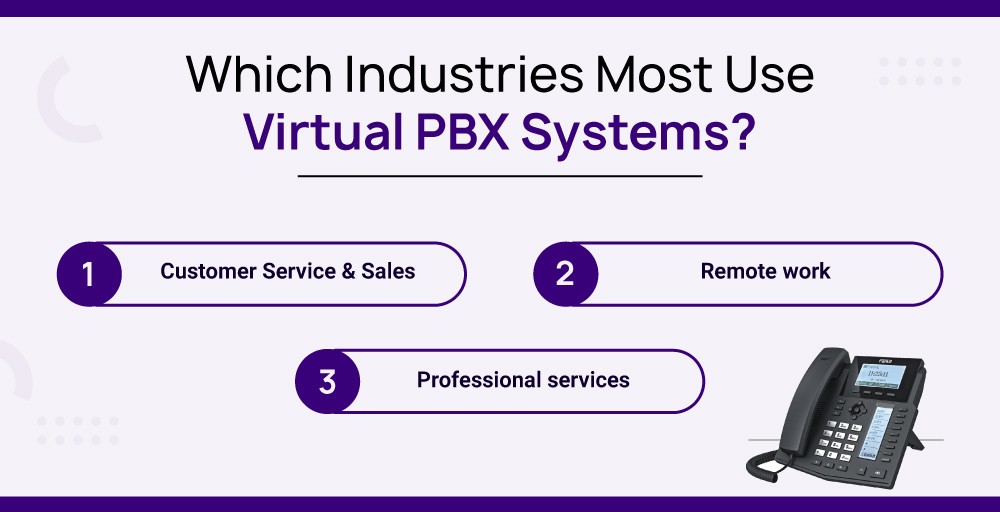
However, 3 major industries widely make use of this phone system.
1. Customer Service and Sales
The industry with the highest use of a virtual PBX system is customer service and sales. This industry ranks first as almost all businesses have a department for customer service and sales, whether they sell products or services. This industry primarily uses features like:
- Call routing
- Auto attendants
- Call recording
2. Remote Office work
Another major industry that uses the virtual PBX most is remote work. The fact that businesses can recruit employees from anywhere in the world has helped in the transformation of the workforce. This flexibility attracts industries like
- Information technology (IT)
- Consulting
- Creative agencies
3. Professional services:
The need and demand for professional services have increased. Hence, this industry is shifting towards the use of virtual PBX to offer a better service. This industry includes Lawyers, accountants, and real estate agents. The following features have made the use of virtual PBX ideal in professional service:
- Call forwarding
- Voicemail transcription
- Video conferencing
How Does Virtual PBX System Work?
Virtual PBX system seems to be a very sophisticated phone system; however, believe us when we say that this phone system operates in a very simple way. How? Let’s see.
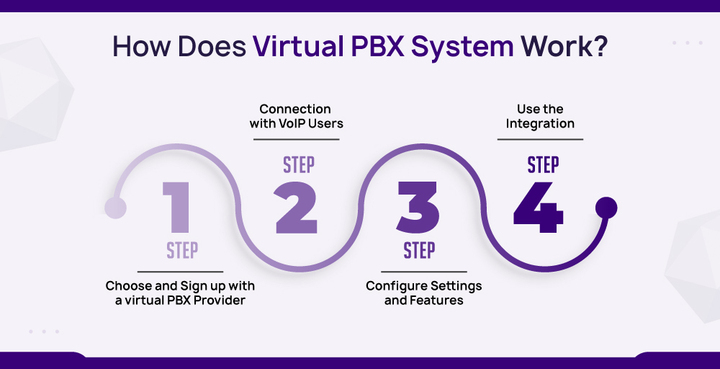
The Virtual PBX system seems to be a very sophisticated phone system; however, believe us when we say that this phone system operates in a very simple way. How? Let’s see.
Step 1: Choose and Sign up with a virtual PBX Provider
Select a service provider that provides the features and capabilities you require. This might include features like call forwarding, call routing, IVR, automated attendants, and voicemail.
Step 2: Connection with VoIP Users
To use the service, every user will require a VoIP phone or a software-based phone application installed on their computer or mobile device. The apps are usually available on both Android and iPhone. The provider usually offers guidance on how to configure and set up these devices. You can always connect with the customer support team if you have any issues.
Step 3: Configure Settings and Features
Customize your system settings through the provider’s online portal. This includes setting up the features, some user interface settings, customization options, and other similar settings, which helps users to use the PBX system very easily.
Step 4: Use the Integration
Once you have set up your system you can begin making and receiving calls in a PBX system. Incoming calls can be directed to users or departments according to your preferences. Simailrly, you can use the features and other integrations to enhance the business communication.
How to Set up a Virtual PBX Phone System?
Here are step-by-step guidelines on how to set up a virtual PBX phone system.
Step 1: Assess your needs, such as features and number of users for the phone system.
Step 2: Choose a Virtual PBX provider that aligns with your requirements and budgets.
Step 3: Sign up, create an account, and buy a subscription from the website (Always check for demo service).
Step 4: Select the local or international phone number.
Step 5: Configure and customize settings and features and train employees.
Step 6: Test the phone system and change any feature and setting (if required)
Step 7: Start using the virtual PBX phone system.
What are the differences between Traditional PBX systems and Virtual PBX systems?
The main differences between traditional PBX systems and Virtual PBX systems are tabulated below:
| Basis | Traditional PBX | Virtual PBX |
| Physical Infrastructure | Traditional PBX has on-premises hardware like PBX boxes and physical phone lines. | Virtual PBX are Cloud-based and have no on-site hardware |
| Costs | Traditional PBX has a higher upfront cost, including hardware and installation | Virtual PBX have a lower initial cost and are subscription-based or usage-based |
| Scalability | Traditional PBX offers limited scalability and involves adding more hardware. | Virtual PBX offers greater scalability and easily accommodates growth or downsizing. |
| Maintenance and Upgrades | Traditional PBX requires ongoing maintenance, and upgrades may be complex | In Virtual PBX, the service provider handles maintenance and updates. |
| Geographic viability | Traditional PBX is tied to a physical location. | Virtual PBX has greater geographic flexibility. |
| Feature | Traditional PBX may have a fixed set of features. | Virtual PBX usually comes with a variety of advanced features. |
| Integration | Traditional PBX offers a limited integration and may require custom solutions. | Virtual PBX integrates with other cloud-based services and applications. |
5 Best Virtual PBX System Providers in 2024
There are many virtual PBX System Providers. However, not all are suitable for users looking for a better option.
So, we have listed 5 best Virtual PBX system providers based on the following factors:
- Modern features
- Budget-friendliness
- Worldwide coverage
- Testimonials and Reviews
- And Many More..
| Product | Features | Pricing / Plans |
|---|---|---|
| KrispCall | Unified Callbox, Global Calling, Text Messages (SMS), Voicemail, Voicemail to Email, Shared Phone Number, Call On Hold, Call Notes, Call & Contact Tagging, Call forwarding, Call Analytics | $12/month (if paid annually) |
| Grasshopper | Virtual phone numbers, Call forwarding, Custom greetings, Voicemail transcription, Mobile app, Team extensions, Call recording | $14/month/user |
| DailerHQ | Auto-dialer, Predictive dialing, Call blending, Power dialer,Call recording, Automatic transcription, Real-time call analytics, CRM integrations | Contact the Sales team |
| Exotel | Virtual and Toll-Free Numbers, Call Routing, Auto Attendant, Call Recording and Transcription, Conference Calling, Call Forwarding, Predictive Dialer | Starting at $77 Per 3 Months |
| Dialpad | Virtual Phone Numbers, Call Routing, Auto Attendant, Call Recording and Transcription, Conference Calling, Call Forwarding | Starting at $20 per User/Month |
1. KrispCall
KrispCall is the ideal solution for a virtual PBX system. First, it offers affordable plans with international virtual numbers from over 100 countries, making its coverage one of the best in the PBX service provider industry. Moreover, it offers various integration options, making it best for all businesses.
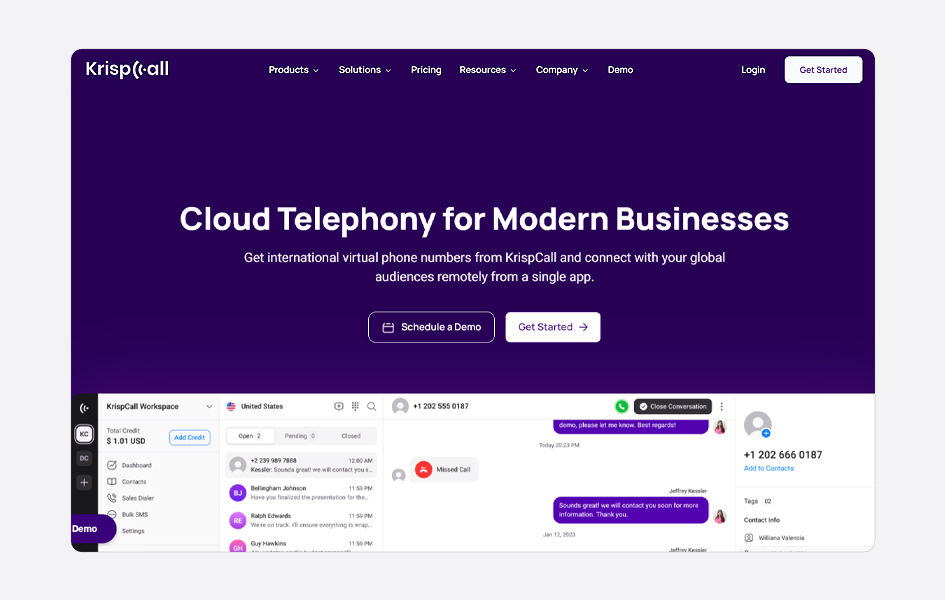
In addition, KrispCall is loaded with advanced features that can cater to all call management-related needs. Finally, it also offers a 24/7 service for all time zones, which in itself is impressive. Check out some of the features of KrispCall that have made it a leading virtual PBX provider.
Features of Krispcall
- Unified Callbox
- Global Calling
- Text Messages (SMS)
- Voicemail
- Voicemail to Email
- Shared Phone Number
- Call On Hold
- Call Notes
- Call Transfer
- Do Not Disturb Mode
- Call Log History
- Multiple Numbers
- Phone Tree (IVR)
- Call Analytics
- Call & Contact Tagging
- Call forwarding
Price: Starting at $12 per user per month.
2. Grasshopper
Grasshopper is a virtual PBX software that enables users to incorporate a telephone system into their personal mobile devices. It empowers you to effortlessly answer business calls from any location and any device by linking your business number to your device.
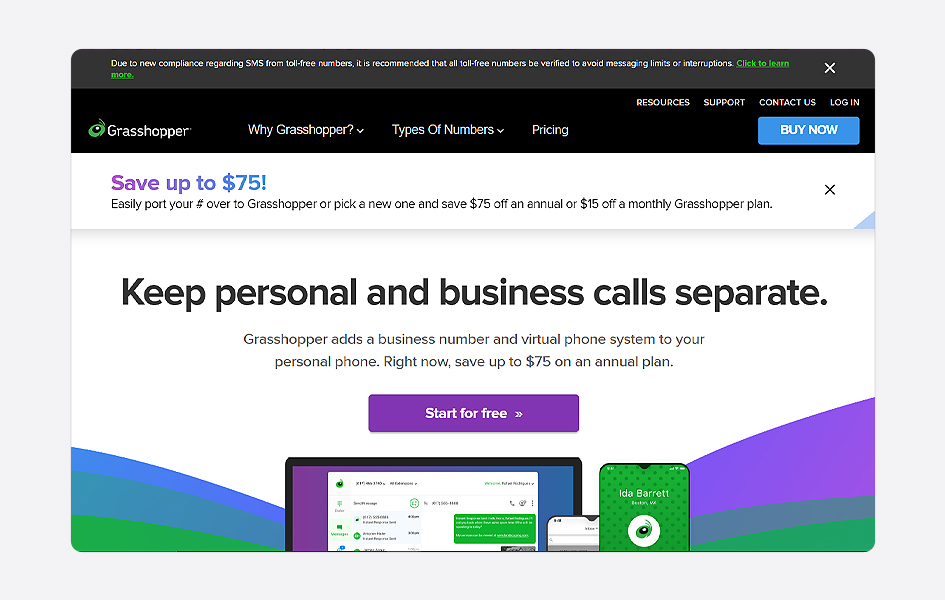
Wait, it only gets better. With Grasshopper, users can conveniently keep their business calls separate, allowing for streamlined call management.
Features of Grasshopper
- Virtual phone numbers
- Call forwarding
- Custom greetings
- Voicemail transcription
- Mobile app
- Team extensions
- Call recording
Price: Starting at $20 User/Month
3. DialerHQ
DialerHQ provides a communication solution for working from any location. This ensures that the user’s personal and business calls remain separate. If you want a quick and easy communication system, DialerHQ is for you. Its easy setup process and user-friendly application make it the software for managing business calls efficiently.
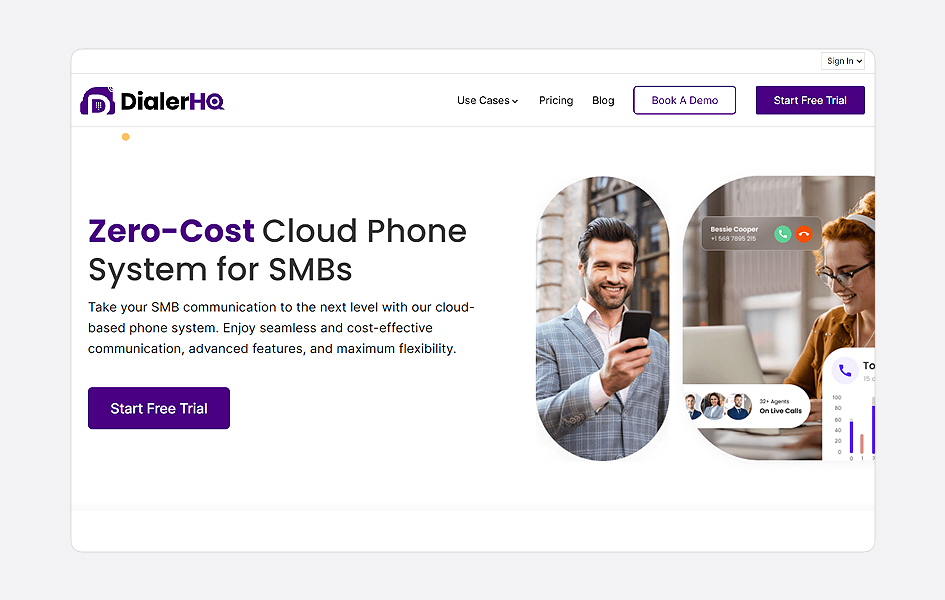
Features of DailerHQ
- Auto-dialer
- Predictive dialing
- Call blending
- Power dialer
- Call recording
- Automatic transcription
- Real-time call analytics
- CRM integrations
Price: Contact the Sales team
4. Exotel
Exotel stands out as the best choice for sales and support teams in need of a reliable hosted PBX solution. It provides the flexibility to adjust call capacity as needed, whether it’s scaling up or managing surges in call volume.
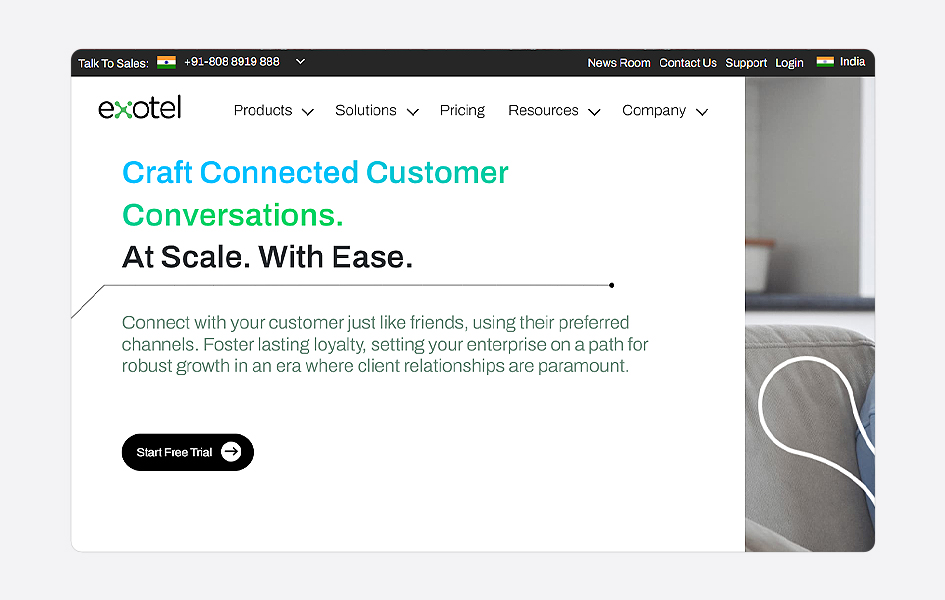
Features of Exotel
- Virtual and Toll-Free Numbers
- Call Routing
- Auto Attendant
- Call Recording and Transcription
- Conference Calling
- Call Forwarding
- Predictive Dialer
Price: Starting at $77 Per 3 Months
5. Dialpad
Dialpad offers a cloud-based PBX system that changes the way you connect with your clients. It provides an intelligent solution that enables you to establish a team and phone numbers swiftly. Moreover, it seamlessly integrates with applications. It is fully compatible with popular platforms like Google Workspace, Salesforce, and Zendesk.
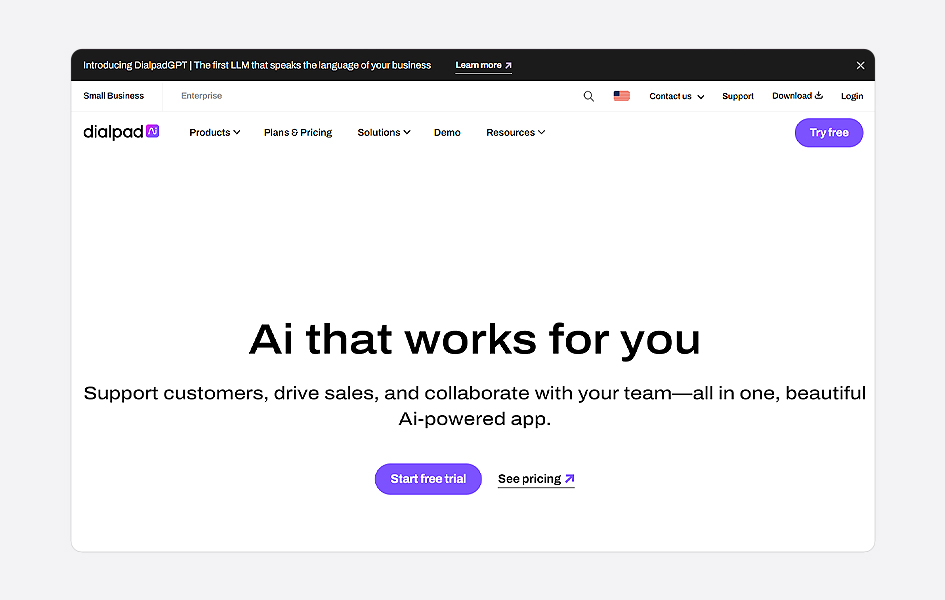
Features of Dialpad
- Virtual Phone Numbers
- Call Routing
- Auto Attendant
- Call Recording and Transcription
- Conference Calling
- Call Forwarding
Price: Starting at $20 per User/Month
Tips to Choose the Right Virtual PBX System for Small Business
Despite the best efforts and research, choosing the right virtual PBX system for your business can be a daunting task. So, here are some tips for choosing the right virtual PBX system.
- Assess Needs: Understand the communication needs that your small business has right now and might need in the future.
- Consider the Budget: Decide on a budget for your virtual PBX system, and consider the initial expenses as well as the recurring subscription fees.
- User-Friendly Interface: Opt for a virtual PBX system with an intuitive and user-friendly interface.
- Reliability and Uptime: Select a provider that has a history of uptime and minimal interruptions in service.
- Customer Support: Assess the quality of customer assistance the PBX provider offers.
- Trial Period or Demo: Choose a provider that gives you the option to try out their virtual PBX system through a trial period or a demo.
What are the future trends in Virtual PBX Systems?
With the constant development of communication technology, we can anticipate many future changes in the virtual PBX system. First, there is a high chance that the virtual PBX will be integrated with AI (Artificial Intelligence) for automating various call-handling processes. In addition, omnichannel communication will be practical in every virtual PBX system.
Furthermore, we can expect all the call centers to go cloud-based/virtual instead of on-premises. Finally, there will be better security protocols for data safety. You can book your free demo anytime with KrispCall to ensure your money goes to the right place.
Conclusion
Summing up, a virtual PBX system has become an indispensable part of a business communication system. So, if you are not using this in your business, it might be a good idea to consider integrating it in your communication. If you still have second thoughts, cover the benefits mentioned above; this might change your mind.
However, if you have made up your mind to use this phone system, consider KrispCall as your ideal service provider. Schedule a free demo now and determine if KrispCall meets your business requirements.
FAQ
What are some tips for getting the most out of my virtual PBX system?
Here are some tips for getting the most out of your virtual PBX system:
- Explore and use advanced features.
- Customize call routing and greetings based on your service and customers.
- Use analytics and reporting.
- Buy quality equipment.
- Employee Training and Development.
- Regularly review and update your settings.
- Seek support from your provider.
- Stay informed about new features and updates.
What are the two types of PBX?
The two types of PBX are as follows:
- Hosted PBX
- On-premises
Does Virtual PBX require internet?
Yes, Virtual PBX requires an internet connection for its operation.

